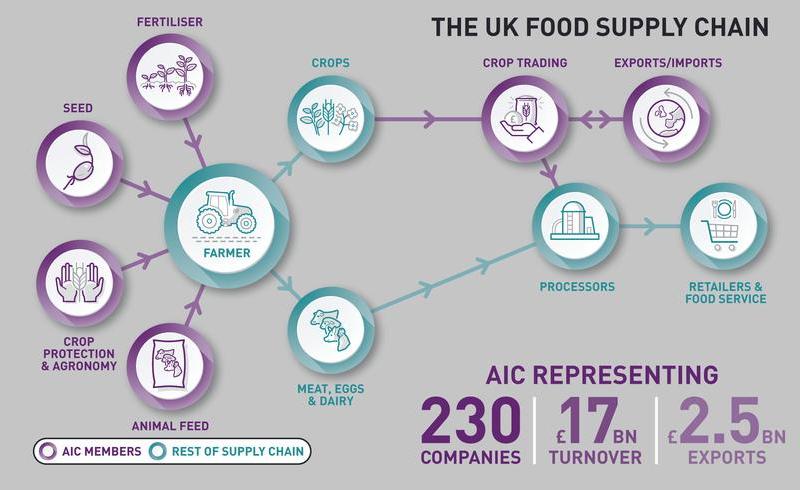Farmers reminded of responsibilities around fertiliser storage, sales, and purchase
The Agricultural Industries Confederation (AIC) and AIC Services, which manages the Fertiliser Industry Assurance Scheme (FIAS) is reminding farmers of their responsibilities to store fertiliser safely and securely, in light of the rising cost of nitrogen-based fertiliser and potential excess stock on farms.
“As high global gas prices push up the cost of nitrogen-based fertilisers, we are aware that some farmers are facing difficult decisions about crop feeding plans this winter and next spring. This is of particular concern where farmers don’t have sufficient stock or orders in the pipeline to cover their needs, since the disruption to the fertiliser supply chain could continue into spring 2022,” says Roberta Reeve, Technical Manager of FIAS.
Another area of concern is the rising value of existing stocks of nitrogen-based fertilisers on farm which could lead to increased thefts.
“While light-hearted comments on social media about selling excess stock of fertiliser may appear harmless, this may draw attention of the situation to criminals.
“There is a risk of nitrogen-based fertilisers being used for illegitimate purposes, and anyone handling or storing these products has a responsibility to provide secure storage and to remain vigilant to potential theft,” warns Mrs Reeve.
Farmers can make best use of their available stocks of fertiliser by seeking advice from a FACTS qualified adviser.
Where cropping plans have changed and excess stocks are no longer needed, re-selling the fertiliser is an option but must be done through proper channels, via a return to the original supplier and refund or re-sale.
It is illegal to sell ammonium nitrate without the correct documentation and fertilisers should not be advertised on auction sites, local trade magazines or social media.
Mrs Reeve further reminds farmers not to purchase fertiliser unless the source is known and they have the correct documentation.
“Sellers should be FIAS approved, and you can check this on the Assurance Scheme website. You can also check with your FACTS adviser if you are unsure”.
“Everyone in the industry should be alert to the potential mis-use and mis-sale of nitrogen-based fertiliser by reporting suspicious activity or sales to the police.”
Where farmers are carrying increased stocks into the winter, they should remind themselves of the National Counter Terrorism Security Office’s five point plan for secure storage:
- Wherever possible use a FIAS approved supplier
- Wherever possible keep in a secure area such as a building or sheeted, away from public view
- Carry out regular stock checks and report any loss to the police immediately (call 101)
- Avoid leaving fertiliser in a field overnight – never leave fertiliser in field for a long period of time.
- Remember it is illegal to sell ammonium nitrate without the correct documentation
ENDS
About AIC
As the UK agricultural supply industry's leading trade association, the Agricultural Industries Confederation (AIC) represents businesses in key sectors within the supply chains that feed the nation.
Its Member businesses supply UK farmers and growers with the animal feed, fertiliser, seed, crop protection products, trusted advice and quality services that are essential to producing food, as well as trading crops and commodities across the globe.
Formed in October 2003 by a merger of three trade associations, today AIC has over 230 Members in the agri-supply trade and represents £17.8 billion* turnover at farmgate.
AIC works on behalf of its Members by lobbying policymakers and stakeholders, delivering information, providing trade assurance schemes, and offering technical support.

AIC Services manages a range of services, including Trade Assurance Schemes and professional registers recognised by the UK Government as essential means to underpin feed and food safety alongside fertiliser security.
These schemes and professional registers include:
- Trade Assurance Scheme for Combinable Crops (TASCC)
- Feed Materials Assurance Scheme (FEMAS)
- Universal Feed Assurance Scheme (UFAS)
- European Seed Treatment Assurance (ESTA)
- Fertiliser Industry Assurance Scheme (FIAS)
- Feed Adviser Register (FAR)
- Renewable Energy Directive (RED)
- Forage Assurance Scheme (FAA)
- AIC Services Palm Oil Credit Scheme (APOCS)
*According to a 2023 survey of AIC Members.
Press Contact
Wendy Ford, Communications Manager, AIC
+44 (0)1733 385230
[email protected]

